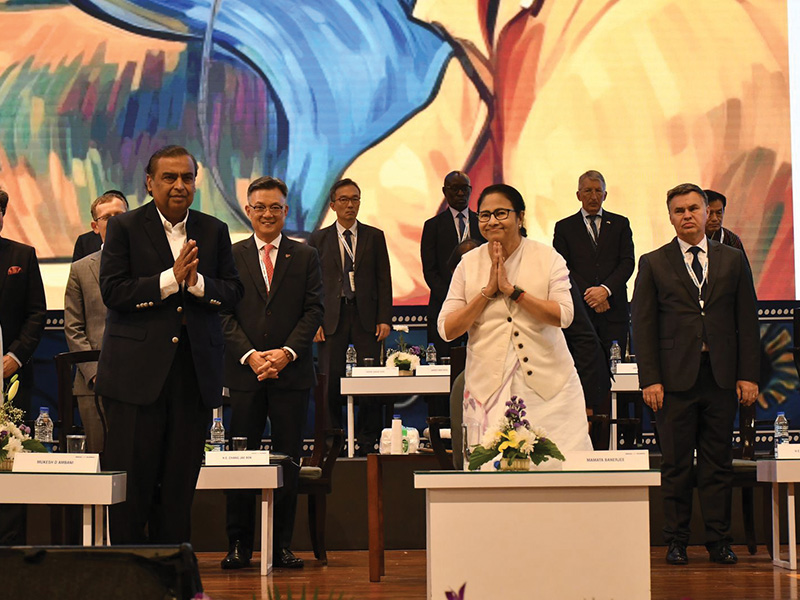Baishali Mukherjee (Kolkata)
 Although the next legislative assembly election in West Bengal is in the distant future (2026), three-term chief minister Mamata Banerjee (who in a classic case of nepotism has groomed her nephew Abhishek to take over after her) has less than six months to make good her promise to bag all 42 Lok Sabha, Delhi seats in General Election 2024.
Although the next legislative assembly election in West Bengal is in the distant future (2026), three-term chief minister Mamata Banerjee (who in a classic case of nepotism has groomed her nephew Abhishek to take over after her) has less than six months to make good her promise to bag all 42 Lok Sabha, Delhi seats in General Election 2024.
Therefore, she is pulling out all stops to restart the state’s engines of economic growth which have been idling since 2011 when she famously kicked Tata Motors out of Singur where the company had established a motor-car manufacturing facility, to address the state’s ballooning unemployment problem. One of the initiatives she has urgently taken is to recruit and appoint government primary-secondary school teachers statewide despite high court orders staying recruitment because of exam scams. Another is to attract investment in industry and business.
On November 21-22, she hosted the seventh edition of the Bengal Global Business Summit (BGBS) 2023 which attracted participation of 5,000 national and 400 international delegates (700 more than BGBS 2022) from 40 countries including the US, UK, Japan, Poland, France, Australia, Germany, Malaysia, Bangladesh and Fiji.
During the two-day event 188 MoUs (Memoranda of Understanding) and Letters of Intent were signed between the state government, and foreign and domestic companies and education institutions. If they translate into implemented projects they would result in a massive inflow of Rs.3.76 lakh crore into the state’s economy and generate 4 million jobs in the state which has 7.6 million registered unemployed youth. Notably, Reliance Industries chairman Mukesh Ambani pledged to invest Rs.20,000 crore in West Bengal over the next three years.
A significant feature of BGBS 2023 was 13 MoUs signed between several state and foreign universities, with investment promises of Rs.1,676 crore for K-12 education and Rs.3,060 crore for higher education. Partnership agreements were signed between renowned education institutions, industry leaders, and technology innovators to transform the state’s educational landscape.
However, academics in Kolkata caution that signing of MoUs and investment pledges are ceremonial statements of intent rather than binding contracts. Ground conditions and the investment climate — obligations of the state government —have to be right for statements of intent to translate into on-the-ground projects.
In this connection, West Bengal’s post-independence history has been disastrous. From the mid-1960s onward, communist parties — CPI and CPM — dominated West Bengal politics and during the uninterrupted rule of the latter for 34 years (1977-2011), runaway state-backed trade unionism prompted sustained flight of capital and destroyed the state’s industrial base, resulting in mass unemployment. Unfortunately since then, extortionist CPM youth-wing members have switched sides and have continued to create law and order problems as youth wings of TMC, the incumbent ruling party. This unchanged status has made domestic and foreign investors wary of investing in West Bengal.
However according to Banerjee, Rs.10 lakh crore of Rs.15 lakh crore worth of investment proposals made in the last six editions of the Summit, have already been invested creating 23.6 million jobs. But Central government data drawn from the department of policy and promotion indicates that only 4.16 percent of the Rs.15 lakh crore investment proposals from several BGBS editions have moved beyond paper to projects stage.
Meanwhile according to the state’s labour ministry data, 177 factories were closed in the past decade rendering 29,084 workers jobless. Moreover according to the state education department, 6,845 government primary and 1,362 higher primary schools have downed shutters.
Against this backdrop, organising BGBS 2023 in November — the final stretch before General Election 2024 (previous BGBS conclaves were held between January-April) — is being interpreted as Banerjee’s last ditch effort to mobilise electoral support before the Lok Sabha elections.
But few monitors of West Bengal’s unruly political scene believe that the impressive investment proposals of BGBS 2023 will strike a responsive chord within the electorate and serve as a game changer for this fiery leader who needs to win an overwhelming number of Bengal’s 42 Lok Sabha seats to make an impact in national politics.
Also read: West Bengal: ED interrogates TMC’s Abhishek Banerjee for 9 hours in school jobs scam


















